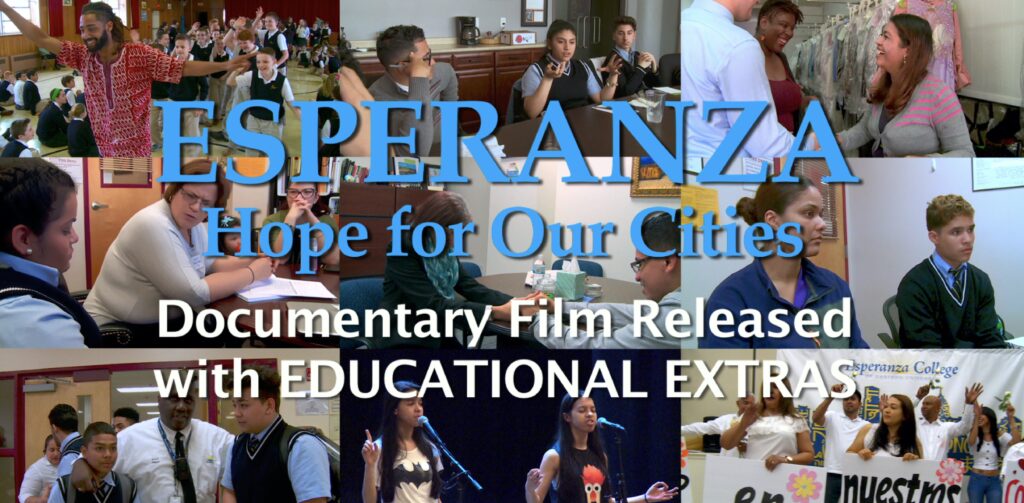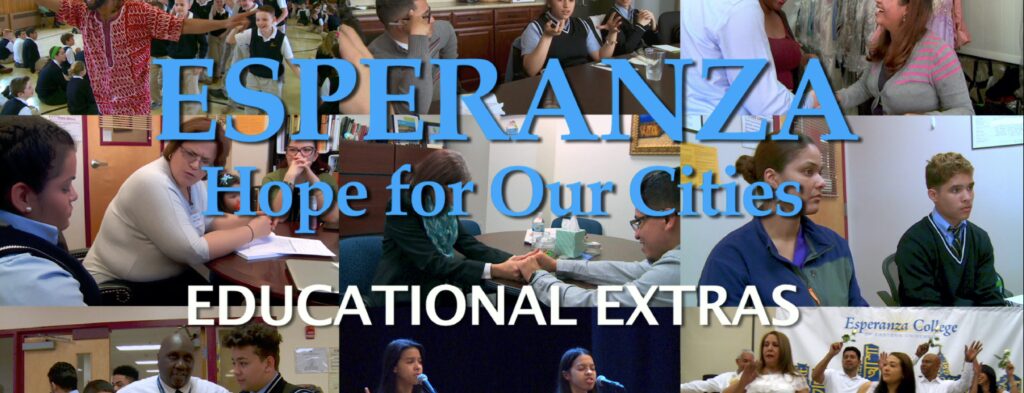A MODEL for TRANSFORMING INNER-CITY LIFE!
Featuring Esperanza’s exemplary educational work with inner-city youth.

“An uplifting film that gives hope to those who work in largely minority schools, and an eye-opener to those unfamiliar with teaching in these districts.” Larry Cuban, Prof. of Education Emeritus, Stanford University
“Absolutely fantastic–informative, engaging, inspiring, and piercing.” Justo González, Pioneering Hispanic theologian & author
“A key factor in the growth of a holistic Christianity in the US.” Edwin Aponte, Dean, Drew Theological School
“An amazing story of the pedagogy of hope anchored in practice. This mission driven, holistic approach to creating better societies by building resilience in each individual is an example for so many who are responsible for the education of our nations.” Lorna Dreyer, Prof. of Educational Psychology, University of Stellenbosch
“Powerfully evokes the meaning & impact of Esperanza’s multifaceted urban work, a guiding light for urban ministries nationwide.” Joel Carpenter, Founder, Nagel Institute for the Study of World Christianity, Calvin University
“A powerful story of a community development organization grounded in the transformational vision of a liberating faith.” Edwin Hernández, Executive Director, The Louisville Institute
“An inspirational story of faith in action . . . Dramatically proves that there is, indeed, hope for our cities.” Tom Webber, East Harlem educator, activist & author
For fuller comments from these and other experts click here.
Founded by Hispanic Protestant clergy to strengthen the largely poor communities of North Philadelphia, Esperanza has gathered together talented educators, housing and immigration counsellors, business corridor developers, music teachers, and more—from diverse religious backgrounds—around its founding mission to “serve the least of these” (Matthew 25). From its founding in 1987, it has grown to a robust, multi-faceted organization with over 630 employees and an annual budget of more than $72 million, with impressive impacts on many challenging fronts in inner-city life, which recently earned its founding president, the Rev. Luis Cortés, the city’s prestigious Philadelphia Award, the first Hispanic to be so honored.
This intimate documentary focuses largely, but not only, on Esperanza’s exemplary educational work with inner-city youth in its public charter high school, which out-performs public schools around it, and in its two-year Christian college. It captures in vivid, personal ways how this mission-driven organization meets youth and their families where they are with positive, transforming effects, and holds important lessons for how such mission-driven educational work, along with Esperanza’s other community-strengthening work, serves as a model for what can be done to transform our cities, as leading thinkers on that subject attest.
Watch trailer here:
Streaming now on Redeem TV online here.
For institutional streaming rights contact us at: contact@jamesault.com
For personal viewing of the film click here.

Short videos on other branches & dimensions of Esperanza’s work & follow-ups on film characters.
For Educational Extras page click here.
Film Project’s Story
By Producer/Director, Dr. James Ault
This documentary film project actually began with a small grant from the Louisville Institute to produce a documentary on the life of Virgilio Elizondo, a Mexican-American Catholic priest from San Antonio, Texas, considered one of the founders of Hispanic theology in the United States. However, as I was working with Father Elizondo to plan our main filming, he was named in an aggressive, self-aggrandizing lawsuit that ended up tragically taking his life. What should we do with the funds? On the suggestion of Joel Carpenter, a longstanding friend and colleague, we ended up applying the grant to tell Esperanza’s story.
I had been aware of Esperanza’s work since the late 1990s when Danny Cortés, brother of Esperanza’s founding director, Luis Cortés, and then my Program Officer at Pew Charitable Trust for my African Christianity Rising films, took me to visit its new offices. However, given the fact that the average cost of a PBS documentary hour is over $1million, applying this small grant of $25K for a biography of one person to tell the story of a complex organization like Esperanza, with many branches and many characters, seemed a daunting, perhaps impossible, task. However, what I began seeing in preproduction research and early filming in various branches of Esperanza’s work, blew me away in terms of its excellence and effectiveness in addressing the challenges in the lives of the inner-city poor and committed me to carrying out the project despite such funding limitations. [To read further visit Educational Extras page.]
Lessons from Esperanza’s Educational Work
By Producer/Director, Dr. James Ault
Since I have no expertise on educational work in inner-city contexts, I look forward to posting reflections experts see in our film about Esperanza’s exemplary educational work. Meanwhile, as a sociologist/ethnographer filming in Esperanza’s schools, I do have some of my own reflections to share.
First, I take to heart the statement of David Solivan, one of Esperanza’s early leaders, that its high school’s success derives from the mission-founded culture planted by its Hispanic clergy founders with their commitment to “serve the least of these,” citing Matthew 14. In its public charter schools, I came to see, teachers and staff from diverse religious backgrounds—Jews, atheists and non-Christians, like the poetry group leader, Anna Pizzimenti—all feeling comfortable joining in that mission-driven work to care for their students, as the Educational Extra dealing with the reflections of some non-Christian teachers and staff reveals. That founding mission finds expression in Luis Cortés’ statement that he recruited Elizabeth Conde-Frazier to head their new Christian college “because she has passion for the individual soul,” something Dean Conde-Frazier demonstrates as she walks the hallways and takes time to mentor and care for students individually, in order to meet not only the educational gap they face in life, but also the “gap of the soul,” as she profoundly puts it.
But, to care for students’ individual souls means meeting them where they are in life, which requires understanding the circumstances of their lives and the very culture, or taken-for-granted assumptions and values that shape them. Here I would point to two important elements of culture Esperanza’s schools address: family and fighting. Fighting was one of the challenging issues that had to be addressed in laying the foundation for Esperanza Academy high school’s culture (and a subject too complicated, and set in the past, to include in the film itself). Fighting’s appeal to youth was shaped by the dangers in their neighborhoods, from crime and gang violence which flourished as a means to earn an income through the illegal drug trade, but also as a means to protect family and neighborhood given the weakness and unreliability of police protection. In addition, the readiness to fight is strengthened by the man-boy mentor relations gang membership provides young men growing up in fatherless homes, a reality the “Father Poem” of Esperanza Academy’s Poetry Group points to. The sophomore Andres’ story of hanging out with the wrong people who “thought fighting was cool,” and then getting arrested because of it, points to these dilemmas. In its early years the high school struggled with the issue of fighting, finally deciding to apply zero tolerance toward it, which led some community members to criticize them for condemning that familiar element of local culture. [To read further, visit Educational Extras page.]

